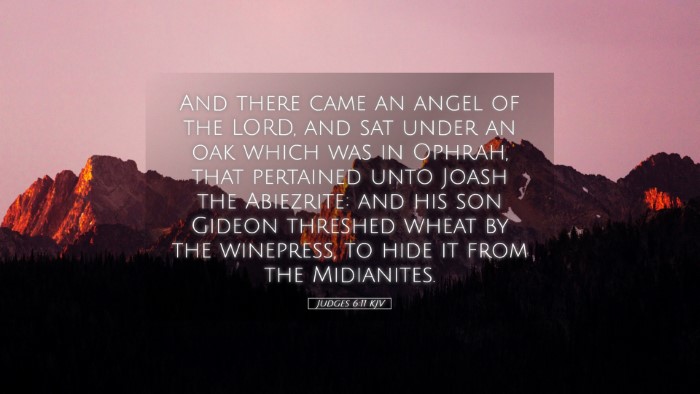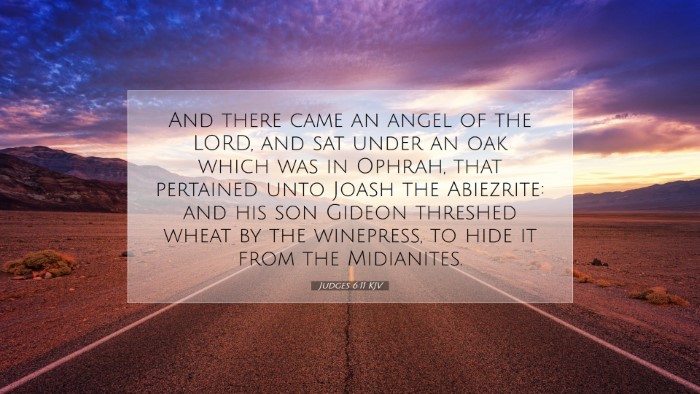Commentary on Judges 6:11
Introduction
Judges 6:11 presents a pivotal moment in the history of Israel, marking the call of Gideon, a figure of great significance in the narrative of the judges. This verse encapsulates the initial encounter between Gideon and the angel of the Lord, which sets the stage for Israel's deliverance from oppression. The insights drawn from traditional commentaries provide a profound understanding of this biblical episode, emphasizing its theological implications and practical applications.
Scriptural Context
In the book of Judges, the Israelites face cycles of sin, oppression, repentance, and deliverance. Chapter 6 records a period of severe oppression under the Midianites, reflecting the consequences of Israel's disobedience to God. This context is vital for understanding how divine intervention is both a response to human need and a revelation of God's mercy and providence.
Verse Analysis
Judges 6:11 states: "Now the angel of the Lord came and sat under the terebinth at Ophrah, which belonged to Joash the Abiezrite; while his son Gideon was beating out wheat in the winepress to hide it from the Midianites."
Divine Encounter
The appearance of the angel of the Lord signifies God's direct involvement in human affairs. Matthew Henry notes that this encounter was no mere coincidence but a deliberate action by God to initiate a transformative journey for Gideon. The moment is marked by an intimate engagement between the divine and the individual, illustrating that God often meets people in their daily struggles.
Gideon's Situation
Gideon is described as "beating out wheat in the winepress," an act of desperation due to fear of the Midianites. Albert Barnes reflects on this metaphorical act, highlighting the contrast between Gideon's utilitarian actions and the grand purpose God has in store for him. The winepress, typically used for grapes, symbolizes a place of hiding rather than harvesting, showcasing Gideon's lack of faith and the Israelite's plight.
Theological Implications
The setting of this verse invites readers to consider broader theological themes such as God's sovereignty and human frailty. Adam Clarke emphasizes that God often chooses unlikely individuals to fulfill His purposes. Gideon's ordinary task underscores the notion that divine calling can emerge in the most mundane contexts, signifying that no situation is beyond God's notice or influence.
Symbolism of the Terebinth Tree
The terebinth tree is emblematic in the biblical narrative. It often signifies a meeting place between God and humanity. Matthew Henry notes that this particular setting in Ophrah reinforces God's ability to reach people in their familiar environments. The tree thus becomes a symbol of divine revelation, where significant encounters with God are initiated.
Historical and Cultural Context
To fully appreciate the significance of Judges 6:11, it is essential to consider the historical backdrop of Midianite oppression. The Midianites had devastated Israel, causing fear and despair among the people. The act of threshing wheat in secret illustrates the broader cultural dynamics of vulnerability and the fight for survival. Scholars point out that such oppressive conditions create a desperate need for leadership and divine intervention.
Gideon's Identity and Heritage
Gideon is described as the son of Joash, identifying him within a familial and tribal context. Albert Barnes highlights that acknowledging Gideon's lineage as an Abiezrite places him within the larger narrative of Israel's heritage, signifying that deliverance will come from within Israel itself. This emphasizes the theme of unlikely heroes chosen to restore faith and hope among God's people.
Interpreting Divine Silence
Gideon’s actions reflect a state of fear and uncertainty regarding God’s presence in Israel's current plight. Adam Clarke discusses this silence of God amidst suffering, prompting Gideon’s hidden actions. This silence can foster a sense of abandonment, yet it is precisely in such moments that God often prepares His servants for significant tasks.
Applications for Today
Judges 6:11 serves as a practical reminder for modern readers about the nature of God’s call. Here are some applications derived from the text:
- Divine Presence in the Mundane: God meets us in our everyday struggles. Like Gideon, we may find ourselves in hiding, yet God's presence can change our circumstances.
- God’s Sovereignty: The Lord chooses unlikely vessels for His purposes. This encourages individuals to remain open to God’s calling regardless of their current situations or insecurities.
- Encouragement in Hardship: Just as Israel faced oppression, believers today can find hope in God’s eventual deliverance, often initiated through their vulnerability and faith.
- Importance of Community: Gideon’s identity as part of a larger community encourages believers to recognize their roles in the Body of Christ for collective impact.
Conclusion
In Judges 6:11, we witness a profound intersection of divine purpose and human fear. The call of Gideon amidst oppression serves as a reminder of God’s faithfulness and method of choosing ordinary individuals to accomplish extraordinary deeds. Through insightful reflections from historical commentaries, this analysis aims to inspire pastors, students, theologians, and scholars to delve deeper into the richness of God’s Word and explore how it applies to contemporary contexts.


